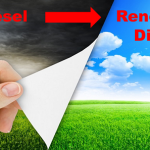The Low Sulfur Diesel Crisis of 2020 And How To Prevent It
“The global economy likely faces an economic crash of horrible proportions in 2020, not for want of a nail but want of low-sulfur diesel fuel,” writes renowned energy analyst Phil Verleger in a note this month titled “$200 Crude, the Economic Crisis of 2020, and Policies to Prevent Catastrophe”. Not good timing for a White House re-election effort if, as expected, the blame falls on lack of preparedness in the 2017-2020 run-up to the projected crisis..
It’s a dire scenario but there’s hard data behind it, and though few go as far as Verleger, almost every expert is warning of a...
Green swan, Black swan: No matter as long as it reduces stranded spending
by Prashant Vaze, The Climate bonds Initiative
In January, authors from several institutions under the aegis of BiS, published The Green Swan Central banking and financial stability in the age of climate change setting out their take on the epistemological foundations for, and obstacles against, central banks acting to mitigate climate change risk.
The book’s early chapters provide a cogent and up-to-date analysis of climate change’s profound and irreversible impacts on ecosystems and society. The authors are critical of overly simplistic solutions such as relying on just carbon taxes. They also recognize the all-too-evident deficits in global policy to respond to the threat.
In short, they accept the need for central banks to act.
The Two Arguments
The paper makes two powerful arguments setting out the challenges central banks face using their usual mode of working.
Firstly, climate change’s impact on financial systems is an unknowable unknown – a...
Ten Economic Risks of Fossil Fuels
Garvin Jabusch A train, loaded with coal, crashed into the back of a passenger train in Czechloslovakia in 1868. Securities of fossil fuels firms, as an economic sector, may soon be on the decline. Predictions as to when oil, gas and coal will become a smaller part of the investment society makes into its total energy mix in favor of renewables (such as solar, wind and ocean energies) vary, ranging from 2060 on the long side (this prediction from oil industry powerhouse Shell) to 2030 or even...
Cleantech Economics 101: Higher Fossil Fuel Prices; More Cleantech
David Gold With all the complexities of cleantech policy and technologies, there is only one simple thing needed for an explosion of competitive clean technologies – increased price of fossil fuels. The amount of R&D expenditures that will need to be invested in clean technology in order for it to hurdle the bar into competitiveness is much greater with low fossil fuel prices. And, the lower those prices, the less appetite the private sector has for making such investments. This leaves a much-increased burden on the back of government through grants and subsidies– a back that is...
Conversions To Renewable Diesel
by Helena Tavares Kennedy
The seasons are changing in many parts of the world right now, but what really is changing this autumn is how the world is looking at renewable diesel. Phillips 66 and REG’s announcement about a new renewable diesel plant on the U.S. West Coast planned for 2021 comes after a notable increase in refineries that are being converted and changed over to renewable diesel. Change is good, especially in this case.
As Bob Dylan sang, “For the loser now, Will be later to win, For the times they are a-changin’.” And who knew he was singing about the RFS...
New York State Pension $ 22 Billion Poorer By Not Divesting 10 Years Ago
Research firm Corporate Knights revealed that the pension fund would be $22 billion richer had it divested from fossil fuel stocks in 2008. That's almost $20,000 for of each of the pension fund’s 1.1 million members & retirees.
A new in-depth analysis by the research firm Corporate Knights, shows that New York State pension fund would be $22 billion richer had it divested from fossil fuel stocks 10 years ago. That works out to almost $20,000 for of each of the pension fund’s 1.1 million members and retirees. To perform their analysis, Corporate Knights looked at the stock holdings of the pension fund in...
The Clean Fossil Fuel? Natural Gas Under Fire
By Christopher Mims According to some of the most complete calculations available, when we use natural gas to generate electricity in an average power plant, it results in 40 percent less warming than if we generate the same electricity with coal. If we fully utilized the natural gas-fired power plants that already exist in this country, we could significantly reduce the amount of coal we’re burning practically overnight. What’s more, primarily because of access to new natural gas reserves, proved reserves of natural gas recently shot up to 284 trillion cubic feet – more than we’ve...
Divesting: Last One Out Loses
Tom Konrad CFA Anew report written by Nathaniel Bullard at Bloomberg New Energy Finance highlights the difficulties large institutional investors would have divesting from fossil fuels. What it does not specifically discuss is that these difficulties could lead to large financial losses for investors who see the difficulty of divesting as a reason to delay. Just as we can't easily fill up our cars with solar power instead of gasoline, the report points out that there is no asset class that can directly substitute for oil and gas in large institutional portfolios. A person...
What the L.A. Methane Leak Tells Us About Investing
by Garvin Jabusch Sempra Energy’s leaking gas field in Porter Ranch, CA, near Los Angeles, has been making national headlines recently, as it now enters its third month of being the largest methane leak in U.S. history. How big is that? The LA Times says that, “by early January, state air quality regulators estimate, the leak had released more than 77 million kilograms of methane, the environmental equivalent of putting 1.9 million metric tons of carbon dioxide in the air.” 1.9 million metric tons of carbon dioxide and counting. In addition, methane isn’t only a powerful greenhouse gas, it can...
Plug-in Vehicles; Waist Deep In The Big Muddy
John Petersen Generation specific cultural references can be treacherous ground for bloggers because the flashback effect is usually limited to readers with long and vivid memories. In this case, however, the lessons of history are so relevant that I'll accept the risk and offer some context for younger readers. In my youth a war wrapped in the liberal ideology of the Kennedy and Johnson administrations and fueled by an underlying concern over who would control oil and gas resources in the Gulf of Tonkin was fought in the jungles of Vietnam, Laos and Cambodia. By current standards,...
Oil & Alt Energy Redux
Charles Morand Last week, I conducted an analysis showing the lack of evidence supporting claims that oil and alt energy returns are strongly correlated (claims that sometimes come from outfits as reputable as Bank of America Merrill Lynch). I don't want to belabor this topic but I thought I would post the results of another, similar analysis I conducted following comments I received on how to improve the first one. In a nutshell, the comments suggested I do the following: 1) Look at daily correlations or even smaller periods, as "common knowledge" market...
LNG Exports Would Help the Environment
Tom Konrad CFA Photo: Robin Lucas, via Wikimedia Commo With friends like these, who needs enemies? The Sierra Club is fighting new Liquified Natural Gas (LNG) export terminals, because they believe LNG exports would reward and encourage producers of shale gas. Fighting shale gas has blinded them to the bigger picture. If LNG exports were to reward shale gas producers, they would have to be significant enough to raise the price of domestic natural gas. Such large exports would also lower...
Crude Oil & Alt Energy: The Non-Relationship That Just Won’t Go Away
Charles Morand The relationship - or lack thereof - between oil prices and the performance of alt energy stocks has been a long-time interest of mine. I discussed it last in late March when I looked at correlations between the daily returns of alt energy and fossil energy ETFs. At the time, I found that only a weak relationship existed between the two and that if someone wanted to make a thematic investment play on Peak Oil, alt energy ETFs were not an ideal way to do so. Seeing as the popular press and countless "experts"...
What Is Peak Oil?
Charles Morand Peak Oil is a term that has become common currency in energy debates in last three years, due in large part to the spectacular rise in the price of crude between 2005 and the end of 2008. But what does Peak Oil actually mean and, more importantly, what do I mean when I use it in my articles? In the purest and original sense of the term, Peak Oil refers to the point in time at which the rate of oil production (as measured, for instance, in barrels per day) peaks. This peak,...
The Best Peak Oil Investments: Why Invest for Peak Oil?
...and Why Not Invest in Oil Companies? Tom Konrad CFA The purpose of this series on peak oil investments has been to highlight companies outside the oil sector that are likely to benefit from increasing oil prices. This article explains why we should expect oil prices to rise. What is Peak Oil? There are many definitions for peak oil. In its most basic form, Peak Oil is the moment of highest production. World oil supplies are finite, and so we cannot continue to produce oil in increasing quantities forever. It's a mathematical certainty that at...
Shale Gas: If this is such a good deal why are you selling it...
Jim Hansen That is the question many buyers of shale gas assets should have been asking themselves over the last few months. This week’s news that shale gas high roller Range Resource was selling its Barnett shale properties reinforced our view that there is major trouble brewing in the shale gas business. Upstreamonline reported that “…Range Resources Corporation said it will sell almost all of its Barnett shale properties to a private company for $900 million…” Then of course there is the number one shale gas play cheerleader of them all, Chesapeake Energy. Just last week they...






